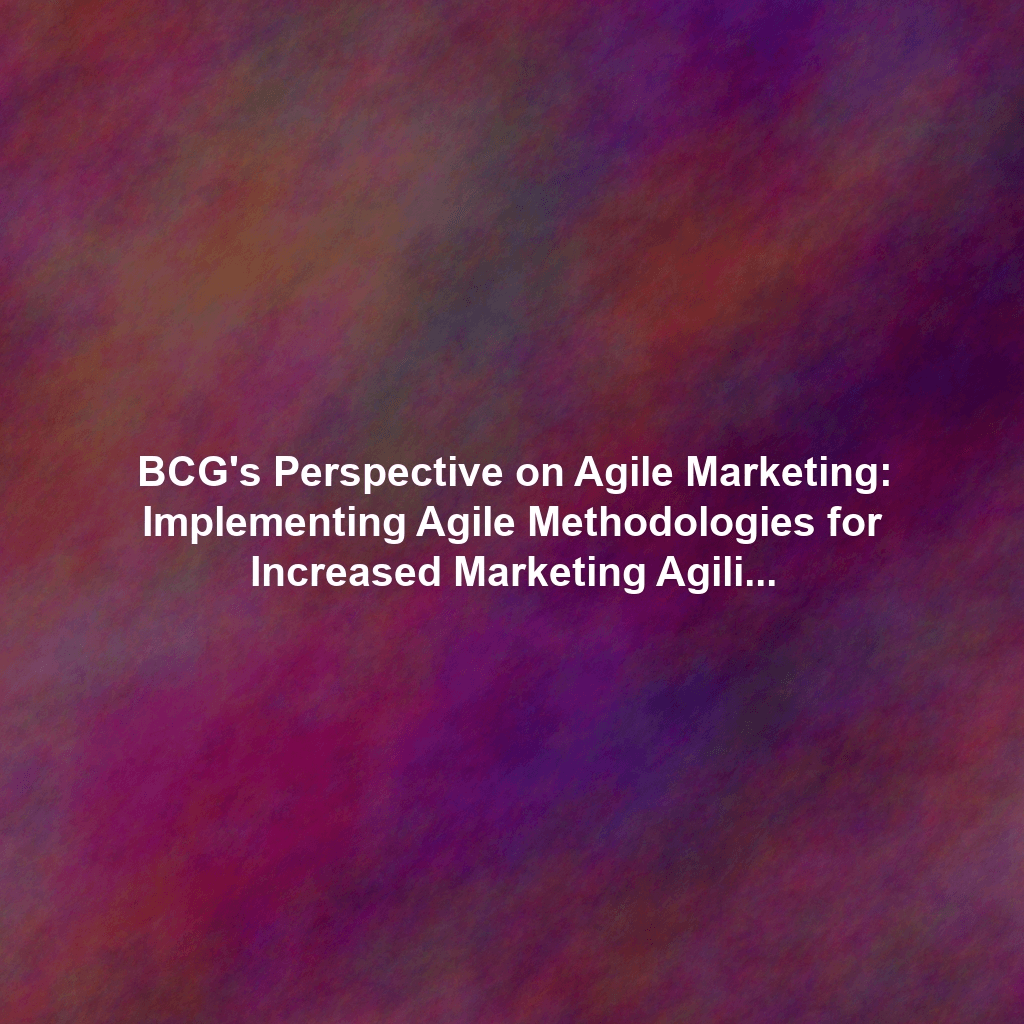In today’s rapidly evolving digital landscape, marketing teams face unprecedented challenges. Traditional, rigid marketing plans are often rendered obsolete before they even launch. To thrive in this dynamic environment, businesses are increasingly turning to agile marketing – a methodology championed by leading management consulting firms like Boston Consulting Group (BCG), McKinsey, Bain, and Oliver Wyman. This article delves into BCG’s perspective on agile marketing, exploring how its principles can be implemented to enhance responsiveness, collaboration, and ultimately, campaign performance.
The Need for Agile Marketing: A Consulting Lens
Management consulting firms like BCG recognize the inherent inefficiencies in traditional marketing. Long lead times, siloed teams, and a lack of real-time data insights contribute to campaigns that are often out of touch with market realities. BCG, along with other top consultancies, advocate for agile methodologies because they directly address these issues. They emphasize the importance of:
- Speed and Adaptability: Quickly reacting to market changes and customer feedback.
- Data-Driven Decision Making: Using real-time analytics to inform strategy and optimize campaigns.
- Cross-Functional Collaboration: Breaking down silos and fostering seamless teamwork.
- Continuous Improvement: Iterating and refining campaigns based on performance data.
These principles align directly with the core tenets of agile project management, adapting them specifically for the unique demands of the marketing function.
BCG’s Approach to Implementing Agile Marketing
While the specific implementation may vary depending on the client’s needs and organizational structure, BCG typically recommends a phased approach to adopting agile marketing:
Assessment and Planning
The first step involves a thorough assessment of the current marketing organization, processes, and technology infrastructure. BCG consultants will work with clients to identify key pain points, bottlenecks, and areas for improvement. This phase also includes defining clear goals and objectives for the agile transformation, such as:
- Increased campaign ROI
- Faster time to market
- Improved customer engagement
- Enhanced team collaboration
Team Structure and Roles
Agile marketing necessitates a shift from hierarchical structures to self-organizing, cross-functional teams. BCG often recommends creating “squads” or “pods” composed of marketers with diverse skill sets, such as content creators, SEO specialists, data analysts, and social media managers. Each squad is responsible for a specific marketing objective or initiative. Key roles in an agile marketing team include:
- Product Owner (Marketing Lead): Defines the backlog of marketing tasks and prioritizes them based on business value.
- Scrum Master (Agile Coach): Facilitates the agile process, removes obstacles, and ensures the team adheres to agile principles.
- Team Members: Collaboratively execute the marketing tasks in the backlog.
Agile Framework and Tools
BCG typically recommends using a well-defined agile framework, such as Scrum or Kanban, to guide the team’s work. These frameworks provide a structured approach to planning, execution, and iteration. They also emphasize the use of visual management tools, such as Kanban boards, to track progress and identify bottlenecks. Popular agile marketing tools include:
- Project Management Software: Asana, Jira, Trello
- Marketing Automation Platforms: HubSpot, Marketo, Pardot
- Analytics Tools: Google Analytics, Adobe Analytics
Iterative Campaign Development
Agile marketing revolves around short, iterative cycles called “sprints.” During each sprint (typically 1-2 weeks), the team focuses on completing a specific set of marketing tasks. At the end of each sprint, the team reviews the results, gathers feedback, and makes adjustments to the campaign. This iterative approach allows for continuous improvement and ensures that campaigns remain aligned with market realities.
Continuous Monitoring and Optimization
Agile marketing is not a one-time project; it’s an ongoing process. BCG emphasizes the importance of continuously monitoring campaign performance, analyzing data, and identifying areas for optimization. This requires a strong focus on data analytics and a willingness to experiment with new tactics and strategies.
Practical Tips for Getting Started with Agile Marketing
Implementing agile marketing can be a complex undertaking, but here are some practical tips to help you get started:
- Start Small: Don’t try to overhaul your entire marketing organization overnight. Begin with a pilot project or a small team.
- Get Executive Buy-In: Agile marketing requires a commitment from leadership. Secure their support before embarking on this journey.
- Train Your Team: Provide your team with the necessary training and resources to understand and implement agile principles.
- Embrace Experimentation: Agile marketing is about learning and adapting. Don’t be afraid to experiment with new ideas and approaches.
- Focus on Communication: Open and transparent communication is essential for successful agile teams.
The Benefits of Agile Marketing: Consulting Firms’ Perspective
By implementing agile methodologies, marketing teams can reap significant benefits, including:
- Increased Agility and Responsiveness: Faster time to market and the ability to quickly adapt to changing market conditions.
- Improved Campaign Performance: Data-driven decision making and continuous optimization lead to better results.
- Enhanced Collaboration and Communication: Cross-functional teams and transparent communication foster a more collaborative work environment.
- Greater Customer Satisfaction: By focusing on customer feedback and iterating based on their needs, marketing teams can deliver more relevant and engaging experiences.
- Higher Employee Morale: Agile environments often lead to more engaged and motivated employees.
Conclusion
Agile marketing is no longer a buzzword; it’s a necessity for businesses seeking to thrive in today’s dynamic digital landscape. Leading management consulting firms like BCG recognize the transformative power of agile methodologies and are helping organizations implement them to achieve greater agility, responsiveness, and campaign performance. By embracing agile principles, marketing teams can unlock their full potential and deliver exceptional results.
 Skip to content
Skip to content

